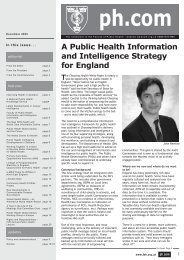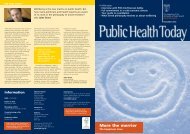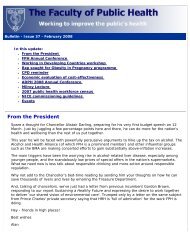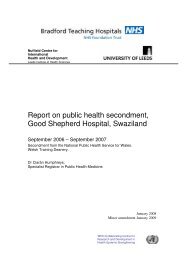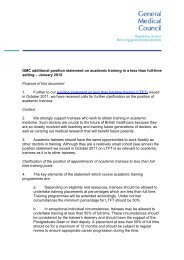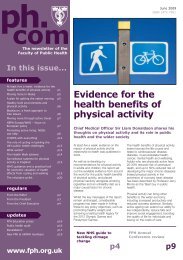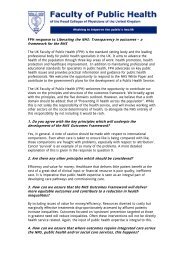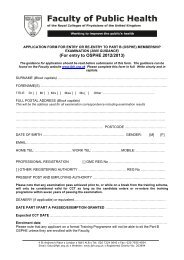- Page 1 and 2:
A Chronology of State Medicine, Pub
- Page 3 and 4:
Published by Faculty of Public Heal
- Page 5 and 6:
ACKNOWLEDGEMENTS ii I am indebted t
- Page 7 and 8:
PREFACE iv "Those who cannot rememb
- Page 9 and 10:
2 INTRODUCTION The chronology start
- Page 11 and 12:
The Norman conquest of England in 1
- Page 13 and 14:
1279 - 1309 1279 Statute of Mortmai
- Page 15 and 16:
1315 - 1358 1315 The Statute of She
- Page 17 and 18:
1360 - 1389 1360 An act set out "Th
- Page 19 and 20:
1462 - 1499 1462 First Royal Charte
- Page 21 and 22:
1530 - 1536 1530-40 Suppression of
- Page 23 and 24:
Branding and slavery imposed as the
- Page 25: 1559 Cont - 1584 1559 cont Under th
- Page 28 and 29: 1601 - 1628 1601 Poor Law Act (43 E
- Page 30 and 31: 1658 Thomas Browne wrote in favour
- Page 32 and 33: 1672 The Scottish Parliament requir
- Page 34 and 35: 1694 - 1698 1694 Bank of England se
- Page 36 and 37: 1721 - 1739 1721 Robert Walpole bec
- Page 38 and 39: 1740 London Hospital (later Royal)
- Page 40 and 41: 1763 "Genera Morborum in Auditorum
- Page 42 and 43: Guy's Hospital Physical Society fou
- Page 44 and 45: Vienna) published; the last volume
- Page 46 and 47: 1788 Cont - 1792 1788 cont complain
- Page 48 and 49: Liverpool Medical Institution found
- Page 50 and 51: First General Enclosure Act (41 Geo
- Page 52 and 53: were passed by the Commons in 1816,
- Page 54 and 55: 1828 Cont - 1831 1828 cont certain
- Page 56 and 57: 1831 Cont - 1832 1831 cont series o
- Page 59 and 60: 1834 Cont - 1836 1834 cont The Hous
- Page 61 and 62: Chimney Sweeps Act (3&4 Vict., c.85
- Page 63 and 64: pressing, for the relief of the lab
- Page 65 and 66: The Select Committee on Smoke Preve
- Page 67 and 68: Final Report of the Royal Commissio
- Page 69 and 70: College, soon to be Manchester Univ
- Page 71 and 72: Societies, and enabled trade unions
- Page 73 and 74: 1858 Cont - 1859 1858 cont London,
- Page 75: ecommendations was the establishmen
- Page 79 and 80: Death of James Barry (1795-1865) wh
- Page 81 and 82: emoval of house refuse. See 1870. A
- Page 83 and 84: under the control of the poor law a
- Page 85 and 86: commission's view that in some dist
- Page 87 and 88: spirits; limited the number of such
- Page 89 and 90: 1874 Cont - 1875 1874 cont Report o
- Page 91 and 92: central inspectorate. See 1883 and
- Page 93 and 94: Artizans Dwellings Act (45&46 Vict.
- Page 95 and 96: (later Sir, 1850-1932, medical offi
- Page 97 and 98: sanitary and safety matters includi
- Page 99 and 100: Elementary Education (School Attend
- Page 101 and 102: 1908. Cleansing of Persons Act (60&
- Page 103 and 104: developed a typhoid vaccine. 1898 C
- Page 105 and 106: education authorities, which were g
- Page 107 and 108: examinations at Oxford or Cambridge
- Page 109 and 110: children. It gave powers for the re
- Page 111 and 112: the Poor Law needed to be reshaped,
- Page 113 and 114: 1910 - 1911 1910 Mines Accident (Re
- Page 115 and 116: 1914 Outbreak of the Great War (191
- Page 117 and 118: The first ante-natal clinic opened
- Page 119 and 120: Medical Women's Federation founded.
- Page 121 and 122: League of Nations was created. See
- Page 123 and 124: age 65 1921 Cont 1921 cont years or
- Page 125 and 126: Ministry of Labour Committee on the
- Page 127 and 128:
wider the scope of these services,
- Page 129 and 130:
school leaving age should be raised
- Page 131 and 132:
1929 Cont 1929 cont care; and the d
- Page 133 and 134:
Fourth Revision of the Internationa
- Page 135 and 136:
1933 Cont - 1934 1933 cont of medic
- Page 137 and 138:
National Health Insurance Scheme pr
- Page 139 and 140:
Matrimonial Causes Act (1 Edw.VIII
- Page 141 and 142:
the London County Council; and the
- Page 143 and 144:
1940 - 1941 1940 Food rationing (ba
- Page 145 and 146:
department of state, and recommende
- Page 147 and 148:
defined role in 1943 Cont - 1944 19
- Page 149 and 150:
1944 Cont 1 1944 cont Disabled Pers
- Page 151 and 152:
egional hospital boards, boards of
- Page 153 and 154:
Health during the war (see 1941). "
- Page 155 and 156:
The Local Government Boundary Commi
- Page 157:
Officers); and, made the Home Offic
- Page 160 and 161:
King Edward's Hospital Fund for Lon
- Page 162 and 163:
1950 - 1951 1950 Korean war started
- Page 164 and 165:
1951 Cont 1 1951 cont a registered
- Page 166 and 167:
"The Advance to Social Medicine" by
- Page 168 and 169:
double helical structure of deoxyri
- Page 170 and 171:
The Acton Society Trust, funded by
- Page 172 and 173:
1957 Dentists Act (5&6 Eliz.II, c.2
- Page 174 and 175:
Slaughter of Animals Act (7 Eliz.II
- Page 176 and 177:
introduction of a national qualific
- Page 178 and 179:
1960 Cont - 1961 1960 cont The Comm
- Page 180 and 181:
authority, with counties (with powe
- Page 182 and 183:
1962 Cont 2 - 1963 1962 cont For th
- Page 184 and 185:
Six small outbreaks of diphtheria i
- Page 186 and 187:
1964 Cont - 1965 1964 cont Council
- Page 188 and 189:
carried out in Buckinghamshire, of
- Page 190 and 191:
1966 Cont 1 1966 cont staff related
- Page 192 and 193:
1966 Cont 2 - 1967 1966 cont Englis
- Page 194 and 195:
1967 Cont 1 1967 cont National Nurs
- Page 196 and 197:
Elderly in Government Institutions
- Page 198 and 199:
Medicines Commission, which set up
- Page 200 and 201:
group therapy, therapeutic communit
- Page 202 and 203:
(chairman, Lord Redcliffe-Maud) cri
- Page 204 and 205:
The abolition of capital punishment
- Page 206 and 207:
1970 Cont 1 1970 cont In November t
- Page 208 and 209:
county boroughs, 34 metropolitan di
- Page 210 and 211:
stated: "Put at its simplest, commu
- Page 212 and 213:
1971 Cont 3 - 1972 1971 cont Betwee
- Page 214 and 215:
physician, the nursing officer, a l
- Page 216 and 217:
and a small number of
- Page 218 and 219:
1972 Cont 4 - 1973 1972 cont King E
- Page 220 and 221:
helping people to use the procedure
- Page 222 and 223:
Trade Union and Labour Relations Ac
- Page 224 and 225:
1974 Cont 2 1974 cont Report by Lad
- Page 226 and 227:
1974 Cont 3 - 1975 1974 cont govern
- Page 228 and 229:
"The School Health Service 1908-74"
- Page 230 and 231:
Layfield) reported. The Committee d
- Page 232 and 233:
personal (as distinct from the clin
- Page 234 and 235:
1976 Cont 3 - 1977 1976 cont commun
- Page 236 and 237:
1977 Cont - 1978 1977 cont features
- Page 238 and 239:
health and medical care, there rema
- Page 240 and 241:
area tier and establishing district
- Page 242 and 243:
1980 1980 Magistrates' Courts Act (
- Page 244 and 245:
Advisory Service, from whom it had
- Page 246 and 247:
and required that provision for spe
- Page 248 and 249:
established the Audit Commission in
- Page 250 and 251:
Mobile Homes Act (c.34) dealt with
- Page 252 and 253:
1984 Rates Act (c.33) reformed the
- Page 254 and 255:
1984 Cont 2 - 1985 1984 cont The Ex
- Page 256 and 257:
"Quality in General Practice" publi
- Page 258 and 259:
1986 Cont 1 1986 cont Ministry of A
- Page 260 and 261:
1986 Cont 2 - 1987 1986 cont The Ro
- Page 262 and 263:
1987 Cont 2 - 1988 1987 cont The Ki
- Page 264 and 265:
House of Commons Social Services Co
- Page 266 and 267:
The Ministry of Agriculture, Fisher
- Page 268 and 269:
water and the disposal of sewage. S
- Page 270 and 271:
1992 Cont 1 1992 cont education; pr
- Page 272 and 273:
National Lottery Act (c.39) enabled
- Page 274 and 275:
A Working Group (chairman, CJ Scott
- Page 276 and 277:
Environment Act (c.25) established
- Page 278 and 279:
esearch). Demands for more money fo
- Page 280 and 281:
1996 Cont 2 - 1997 1996 cont traini
- Page 282 and 283:
historic boundaries between academi
- Page 284 and 285:
zones; introduced the category of f
- Page 286 and 287:
supervision of patients in the comm
- Page 288 and 289:
1998 Cont 4 1998 cont abuse of soci
- Page 290 and 291:
1998 Cont 5 - 1999 1998 cont occasi
- Page 292 and 293:
opportunities; and particular initi
- Page 294 and 295:
that where possible two adjacent ho
- Page 296 and 297:
Parker reviewing 1999 Cont 4 1999 c
- Page 298 and 299:
TABLE POPULATION AND BIRTH AND DEAT
- Page 300 and 301:
APPENDIX 1 SOVEREIGNS FROM 1066 ENG
- Page 302:
APPENDIX 3 MINISTERS OF HEALTH 1919
- Page 305 and 306:
APPENDIX 4 LONDON MEDICAL SCHOOLS P
- Page 307 and 308:
Nissel, Muriel, People Count. A His
- Page 309 and 310:
Animals (Scientific Procedures) 198
- Page 311 and 312:
Cruelty to Animals 1876 Custody of
- Page 313 and 314:
INDEX TO ACTS 5 Factories 1850, 193
- Page 315 and 316:
Infectious Diseases (Prevention) 18
- Page 317 and 318:
INDEX TO ACTS 9 Mines Accident (Res
- Page 319 and 320:
INDEX TO ACTS 11 Professions Supple
- Page 321 and 322:
INDEX TO ACTS 13 Smoke Nuisance (Sc
- Page 323 and 324:
Air Pollution 1953, 1954 Alternativ
- Page 325 and 326:
Elderly at Home. A Study of People
- Page 327 and 328:
INDEX OF OFFICIAL REPORTS 5 Integra
- Page 329 and 330:
INDEX OF OFFICIAL REPORTS 7 Nationa
- Page 331 and 332:
Reform of Local Government in Engla
- Page 333 and 334:
Towards an Integrated Child Health
- Page 335 and 336:
Alzheimer's disease (see also Aged
- Page 337 and 338:
Bethune, Robert de 1148 Beveridge,
- Page 339 and 340:
Bucknill, Sir John 1842 Budd, W. 18
- Page 341 and 342:
Child Support Agency 1991, 1995, 19
- Page 343 and 344:
Cooke, A.M. 1964 Cooper, J. 1966 Co
- Page 345 and 346:
Diabetes 1922, 1925, 1941 Dick, W.
- Page 347 and 348:
Electrocardiogram 1887 Electron 189
- Page 349 and 350:
Fitzroy, A. 1904 Fleas 1897 Fleming
- Page 351 and 352:
Gibb, G.D. 1981
- Page 353 and 354:
Guerin, C. 1921 "Guide to Social Se
- Page 355 and 356:
GENERAL INDEX 21 Hereford, Bishop o
- Page 357 and 358:
Huxham, J. 1750 GENERAL INDEX 23 "H
- Page 359 and 360:
"Journal of State Medicine" 1892 GE
- Page 361 and 362:
Lipworth, L. 1966 Lister, J. 1865 G
- Page 363 and 364:
Mair, A. 1972 Malaria 1897, 1909, 1
- Page 365 and 366:
Medawar, Sir Peter 1953 GENERAL IND
- Page 367 and 368:
GENERAL INDEX 32 “Moral and Physi
- Page 369 and 370:
GENERAL INDEX 34 National Society f
- Page 371 and 372:
Old age pensions (see also National
- Page 373 and 374:
"Physical Deterioration" 1904 Physi
- Page 375 and 376:
GENERAL INDEX 39 Port (sanitary) he
- Page 377 and 378:
GENERAL INDEX 41 Queen Elizabeth Ho
- Page 379 and 380:
GENERAL INDEX 43 Rothschild, Lord 1
- Page 381 and 382:
GENERAL INDEX 45 School boards (Sco
- Page 383 and 384:
Social Medicine, Society for 1956,
- Page 385 and 386:
GENERAL INDEX 49 Tallow-melting 128
- Page 387 and 388:
GENERAL INDEX 51 Universities (see
- Page 389 and 390:
GENERAL INDEX 53 Willink, Sir Henry






